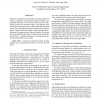Free Online Productivity Tools
i2Speak
i2Symbol
i2OCR
iTex2Img
iWeb2Print
iWeb2Shot
i2Type
iPdf2Split
iPdf2Merge
i2Bopomofo
i2Arabic
i2Style
i2Image
i2PDF
iLatex2Rtf
Sci2ools
ICASSP
2011
IEEE
2011
IEEE
Malicious data attack on real-time electricity market
Malicious data attacks to the real-time electricity market are studied. In particular, an adversary launches an attack by manipulating data from a set of meters with the goal of influencing revenues of a real-time market. The adversary must deal with the tradeoff between avoiding being detected by the control center and making maximum profit from the real time market. Optimal attacking strategy is obtained through an optimization of a quasi-concave objective function. It is shown that the probability of detection of optimal attack will always be less than 0.5. Attack performance is evaluated using simulations on the IEEE 14-bus system.
ICASSP 2011 | Malicious Data Attacks | Optimal Attacking Strategy | Real-time Electricity Market | Signal Processing |
| Added | 20 Aug 2011 |
| Updated | 20 Aug 2011 |
| Type | Journal |
| Year | 2011 |
| Where | ICASSP |
| Authors | Liyan Jia, Robert J. Thomas, Lang Tong |
Comments (0)

